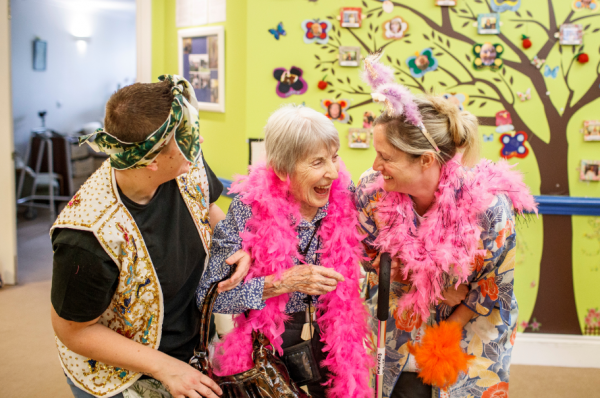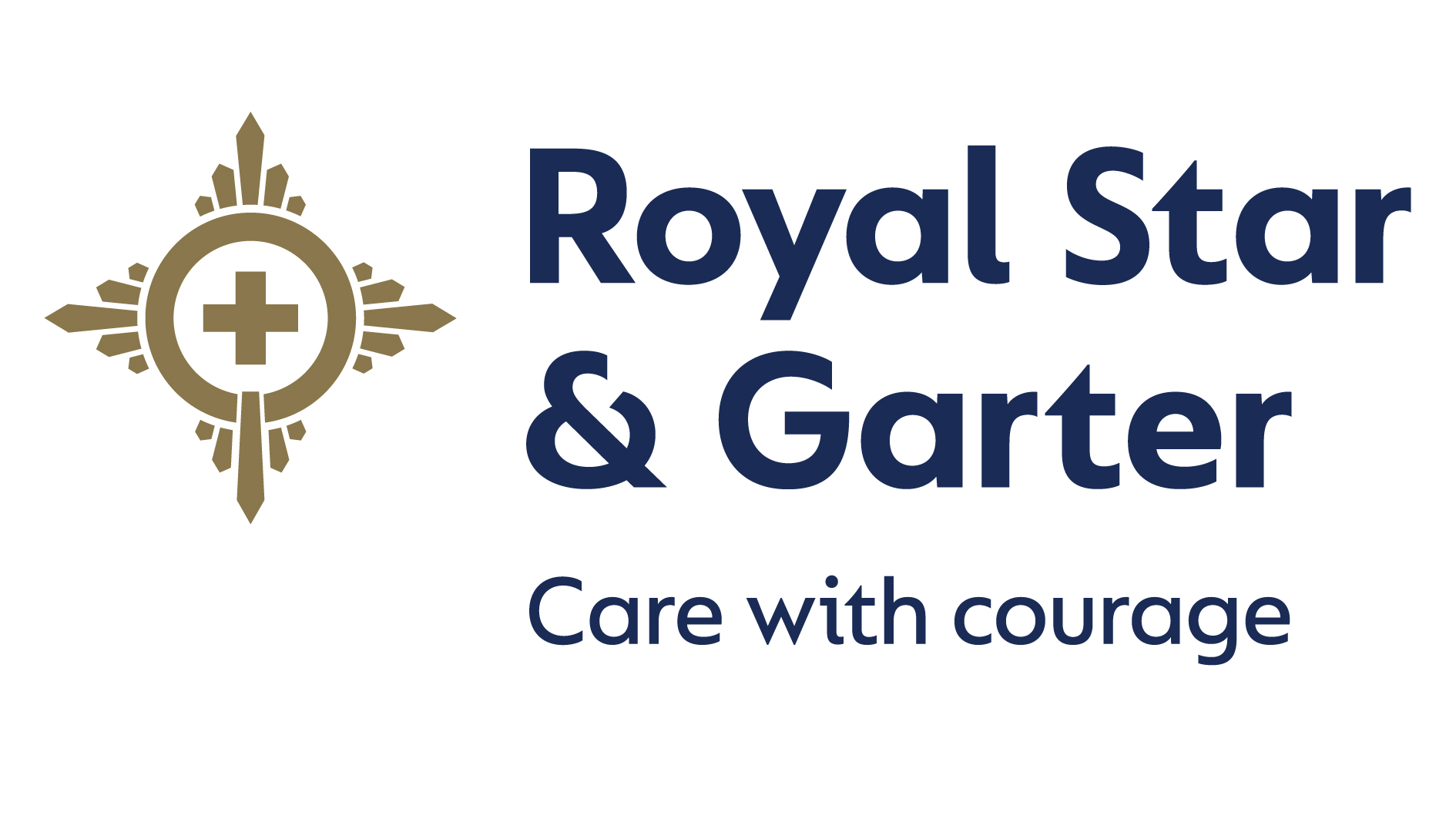The Royal Star & Garter Homes is renowned for the exceptional care it offers residents living with dementia.
Award-winning care is delivered within the specialist areas at our Homes in Solihull, Surbiton and High Wycombe. And while our amazing teams of nurses and carers provide the best care, they do so in an environment which has been carefully designed to be dementia-friendly in every way.
A well-designed dementia care environment can have a huge positive impact on the quality of life of residents living there, with research showing it can lead to improvements both physically and mentally.

Colour:
Our dementia care areas consist of small groups or ‘families’ of people who are at similar points of their journey with dementia. In some of our Homes, this is expressed through colour schemes, which helps people find their way and helps remind residents of where they are. Colour plays a vital role in helping people with dementia, and we have created a colourful, dynamic and interesting environment. To help residents move around the area, there is clear contrast between furniture such as tables and chairs with the walls and floors.
Personal belongings:
A homely and reassuring feeling is fostered with residents’ family photos displayed outside their rooms and in other parts of the Home. Residents are also encouraged to bring their own personal belongings with them which can be used in communal areas, helping them feel at home and adding to the warmth and personal character of the environment. A short biography of each resident outside their room, known as ‘Life Stories’ are also available to help people make positive connections with them.
Garden and gardening:
Being outdoors, connecting with nature is really important for well-being and can do wonders for people living with dementia. Each Home has a garden, where residents living with dementia can enjoy growing flowers, herbs and vegetables in raised beds.
Pop-up reminiscence units and items:
Our Homes have a number of little treasures with items from years gone by which help residents recall all-but-lost experiences, mimicking venues from the past such as a theatre, dance hall, pub, telephone box or sweet shop. Reminiscence items enable us to celebrate residents’ life stories, ensuring each person feels valued and important. They relate to each individual, helping to provide a special brand of ‘person-centred’ care and maintaining the unique and valuable aspects of each resident’s life. The environment is also full of props, known as ‘stuff’. The stuff is deliberate and is intended to be used, not just looked at. This reassures residents and also supports communication. The items prompt reminiscences about residents’ own experiences and recollections over long-submerged memories. Items are selected to be meaningful to the people who live there. They may be connected to a person’s previous occupation, service in the Armed Forces, particular interests and hobbies or, more generally, themes which many can relate to. It helps people find their way around, remember and reconnect.
Mobile sensory equipment:
This is particularly useful for those in later stages of their dementia journey, using visual, auditory and tactile stimuli, to soothe, reassure, and encourage communication and well being. Our Homes have sensory areas or portable sensory units, with music, image projection, and touchable LED light displays which allow the user to employ all, or just some, of the sensory equipment to relax and soothe them. The Charity also owns an omiVista Mobii interactive table, a portable motion-activated projection system creates dynamic images on a surface and keeps residents physically and mentally active by stimulating movement, memory, reasoning and recall. It is particularly beneficial to residents who live with dementia. Visual stimuli includes wall stickers (flowers, trees, butterflies); picture frames with photos of residents to emphasise family life in the Home; pictures of food in the dining area (and a glass-fronted fridge) encourage residents to help themselves and eat; and large text pictures (reading skills are often retained in later stages of dementia).
Clothing and props:
A relaxed approach to clothing, with no uniforms, sees staff wear pyjamas and dressing gowns to remind residents it’s night-time. Staff also wear decorative aprons which contain small memory or sensory items to act as conversational prompts. Sensory aprons and cushions have different textures (fabrics, ribbons etc) and can create distraction; they are helpful for those in later stages of dementia. Many of the people living with dementia also find comfort from dolls and soft toys.
For further information please contact:
Goolistan Cooper
Communications Officer
e: goolistan.cooper@starandgarter.org
t: 0208 481 7669 / 07391 868796
Cally Madden
Marketing & Communications Manager
e: cally.madden@starandgarter.org
t: 020 8481 7692 / 07881 017299
About The Royal Star & Garter Homes:
The Charity provides award-winning care for military veterans and their partners who live with disability or dementia.
The Royal Star & Garter Homes is a charity founded in 1916 to care for the severely injured men returning from the battlegrounds of the First World War.
Today our friendly, state-of-the-art Homes offer a pioneering approach to nursing, dementia and therapeutic care. We have award-winning Homes in Solihull, West Midlands and Surbiton, Surrey. Our third Home in High Wycombe, Buckinghamshire, opened in April 2019.
We continue to expand our services to reach even more veterans. In 2018, we were able to support 186 residents in our Homes and 36 guests at our Day Care service. We also offer interim care for young disabled Service personnel. We provided 11,700 individual sessions of physiotherapy and speech & language therapy last year to support our residents’ health, and over 5,600 places to residents for activities, outings and events, to promote well-being.
We are proud to have enjoyed Royal patronage since our foundation, including that of Her Majesty Queen Elizabeth II from 1953 to the present day.
Twitter: @starandgarter
Facebook: facebook.com/starandgarter
Website: www.starandgarter.org
The Royal Star & Garter Homes is a member of the National Care Forum – the leading voice for not-for-profit care providers. A national perspective may be available from info@nationalcareforum.org.uk or by contacting 02476243619. More details on NCF available at www.nationalcareforum.org.uk.

















